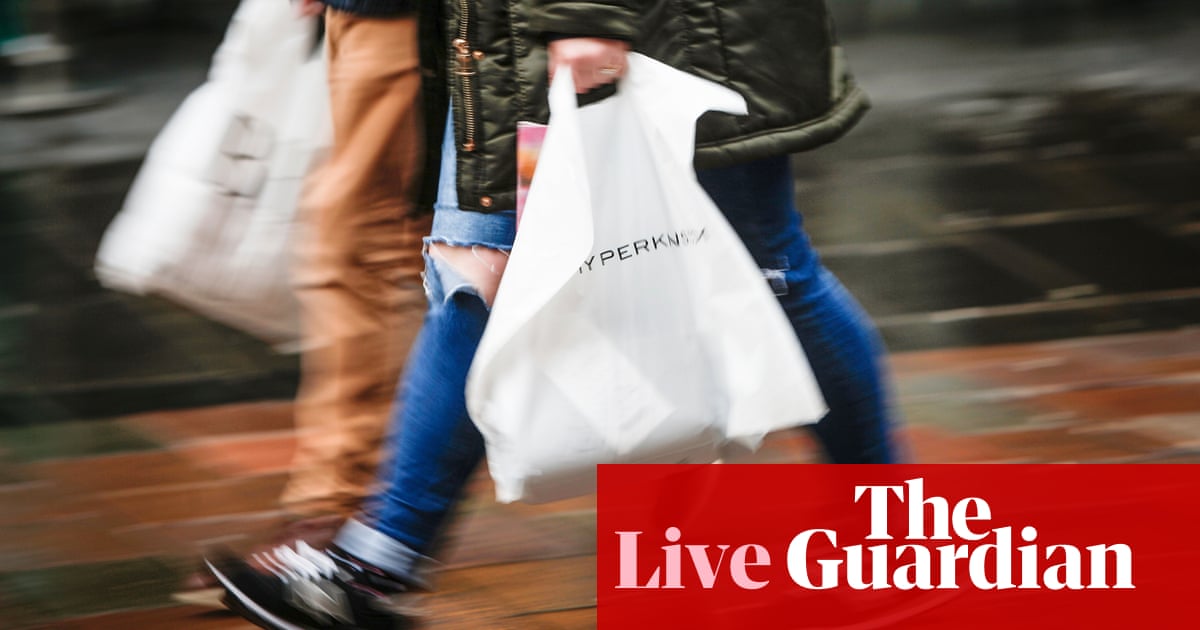Key events

Mark Sweney
Profits at the hedge fund co-founded by the GB News and Spectator owner Sir Paul Marshall plunged by almost two-thirds last year, resulting in significantly reduced payouts for its partners.
Marshall Wace, one of London’s most successful hedge funds, has declared profits of £192m in the year to the end of February 2024, a sharp fall of 64% compared with the £538m the previous year.
Marshall Wace was founded in 1997 by Marshall and Ian Wace and manages more than $71bn (£57.2bn) in funds, making it one of the largest of its kind in the world.
Last year, Marshall sealed a £100m takeover of the Spectator magazine, adding to a media empire that includes backing the often controversial GB News TV channel and the UnHerd website.
Total turnover at Marshall Wace dropped from £1.2bn in 2023 to £768m last year, according to accounts filed this week at Companies House.
The latest accounts show that management fees and other income fell from £637m to £605m.
Read more here:
Fewer than mortgages approved by lenders than expected in November – Bank of England
New data from the Bank of England has provided further signs of an economic slowdown.
Firstly, there has been a slowdown in mortgage lending.
British lenders approved 65,720 mortgages in November. That is less than the 68,500 expected by economists polled by Reuters.
Secondly, data shows that there was a smaller-than-expected net increase in consumer lending, with banks providing just £878m in loans compared to £995m in October.
Overall, consumer credit growth cooled to 6.6% from 7.3%, marking the lowest pace since June 2022.
Andy Sumpter, retail consultant for EMEA for Sensormatic, says retailers will need to get innovative if they hope to reverse the dismal footfall trend that plagued them throughout 2024:
While December saw some flurries of festive footfall around a few key trading days, overall, the picture was filled with much less sparkle as shopper traffic remained subdued in what should have been the highlight of the Golden Quarter.
While store visits did build ahead of Christmas, it was never quite enough to reverse the shopper count deficit against last year.
As footfall limped towards the festive finish line, December’s lacklustre performance compounds a disappointing end to 2024, marking the second consecutive year of declining store traffic.
Retailers will now need to look afresh to 2025 and chart a course to adopt innovative strategies to reverse this trend or maximise the sales potential of fewer visitors, finding new ways to make each store visit count.
German unemployment increased by less than expected in December
DATA ALERT: Figures released by Germany’s federal labour office show that the number of unemployed people across the country rose by 10,000 (on a seasonally adjusted basis) to 2.87 million.
That is lower than the 15,000 increase that had been forecasted by analysts, according to a Reuters poll.
The head of the federal labour office Andrea Nahles said:
The winter break on the labour market begins in December. As a result, unemployment and underemployment increased in December, as is usual for this month.
However, the number of unemployed people in Germany is expected to continue rising this year, and push past 3 million for the first time in a decade, as the country faces a subdued economic outlook.
Nahles said:
Looking back, the ongoing economic downturn in 2024 has left increasingly deep marks on the Labour market.
Donald Trump admonishes UK for North Sea windmills
The US president-elect has taken to his social media platform Truth Social to hit out at the UK for taxing oil companies and allowing windmills in the North Sea.
His post said:
The U.K. is making a very big mistake. Open up the North Sea. Get rid of Windmills!
Trump’s post linked to, and appeared to be a response to, news that an arm of US oil and gas producer APA Corp is planning to exit the North Sea by the end of 2029.
The company said it expects North Sea production to fall by 20% year over year in 2025.
The UK government announced last year that it would increase a windfall tax on North Sea oil and gas producers to 38% from 35%, as well as extend the levy by one year.
The revenue from that tax increase is meant to help fund renewable energy projects, as part of wider plans to decarbonise the power sector by 2030.
However, oil producers working in the North Sea have warned that the move could result in a sharp drop in investments, with some (like APA) deciding to jump ship before the tax increases come into force.

Sarah Butler
Full story: High streets and other shopping destinations have had a “drab December”, ending another year of falling visitor numbers and raising fears of disappointing sales in the most important month for retailers.
Attendance at UK shopping centres, retail parks and high streets was down 2.2% in December compared with the same period in 2023, according to data from the British Retail Consortium (BRC) and analysts at Sensormatic. The decrease was led by a 3.3% decline at shopping centres.
While footfall is no longer a clear guide to potential sales because of the increase in online shopping, the figures will add to anxieties about how retailers performed in the run-up to Christmas.
A swathe of industry trading statements revealing how the crucial period went starts on Tuesday with figures from the clothing and homewares chain Next, which is expected to have gained market share.
Sainsbury’s, Tesco and Marks & Spencer are also likely to have done well, but some clothing and footwear specialists are expected to have struggled, with Quiz and Shoe Zone both issuing profit warnings before Christmas.
Some food businesses, including Morrisons and Asda, are also thought to have faced difficulties amid some operational problems and heavy competition with some discounting of festive vegetables to as little as 8p a bag.
Read more here:
Back to the shopping footfall, the BRC pins part of the problem on the fact that high street shops have not had the extra cash to invest in the kind of ‘experiences’ that can lure consumers.
BRC CEO Helen Dickinson says that is partly the fault of high taxes and burdensome regulations. Retailers are currently fearing a pinch from a hike in employer national insurance contributions and the minimum wage.
Dickinson says:
Shopping habits have been changing fast and customers are increasingly looking for more experiential shopping, as well as a variety of cafes, services and things to do.
Unfortunately, investment in town centres and high streets is held back by our outdated business rates system, which penalises town and city centes.
The government’s proposals to reform business rates may ease the burden for some retailers, but it is vital that, ultimately, no shop ends up paying more in rates than before.
With retailers facing £7bn in additional costs this year from increased tax and regulations, the changes to the business rates system must be made in way that supports retail investment and growth in the years ahead.
Markets have opened for trading on this chilly Friday morning and we’ve got a mixed picture across Europe:
-
FTSE 100 is flat
-
France’s CAC 40 is down 0.2%
-
Spain’s IBEX is up 0.1%
-
Germany’s Xetra DAX is flat
-
Italy’s FTSE MIB is down 0.35%
Introduction: UK retailers suffer ‘disappointing year’ with 2.2% footfall drop
Good morning, and welcome to our rolling coverage of business, the financial markets and the world economy.
We start this Friday with disappointing news for high street shops, as the British Retail Consortium (BRC) reports a 2.2% fall in footfall for December, compared to a year earlier.
That is slightly better than the 4.5% drop in November, but will provide little comfort to the shops that had been hoping for a end-of-year rebound during the all-important Christmas shopping season.
Figures from the BRC show that shopping centres were the hardest hit, followed by high street shops:
-
High street footfall decreased by 2.7% in December (year-on-year), up from -3.7% in November.
-
Shopping centre footfall decreased by 3.3% in December (year-on-year), up from -6.1% in November
-
Retail park footfall was unchanged at 0.0% in December (year-on-year), up from -1.1% in November.
Overall, it meant that fourth quarter footfall was down 2.5%, leaving full-year 2024 footfall down 2.2% compared to 2023.
And although footfall is not an accurate guide to potential sales due to the boom in online shopping, it will add to anxiety about how retailers performed.
The BRC’s CEO Helen Dickinson said:
A drab December which saw fewer shoppers in all locations, capped a disappointing year for UK retail footfall. This means 2024 is the second year in a row where footfall has been in decline.
High streets and shopping centres were hit particularly hard throughout the year as people veered towards retail parks to take advantage of free parking and the variety of larger stores.
Even the Golden Quarter, typically the peak of shopping activity, provided little relief, with footfall down over the period.
While the Black Friday weekend delivered more promising results, they were overshadowed by a lacklustre festive season.
The agenda
-
8.55am GMT: Germany unemployment for December
-
9:30am GMT: UK mortgage approvals, net mortgage lending, consumer credit for November
-
1:30pm GMT: US ISM manufacturing index for December












